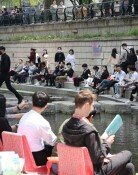Education, Financial Reforms Planned
Education, Financial Reforms Planned
Posted December. 29, 2005 03:01,
Public innovation schools, which are similar to charter schools, established and financed by the government and public corporations, and flexibly managed by private non-profit organizations will be established in 2007.
In addition, transactions only available at banks, such as money transfers, credit card payments remittances, deposits, and withdrawals will be available through securities companies wrap accounts starting in 2007.
From 2008, it is expected that the property tax for commercial real estate will rise due to the proposed integrated tax on commercial buildings and land.
On December 28, the government held a National Economic Advisory Council and public welfare agenda meeting presided over by President Roh Moo-hyun, and confirmed the above.
The government decided to launch a pilot program in which one public high school in each city and province would be converted into a public innovation school by 2007 by revising primary and secondary education laws by the first half of next year.
The public innovation schools would have autonomy comparable to independent private high schools in terms of student admissions, and course selection, even though they would get their financial support from the government and local bodies.
In addition, the Ministry of Finance and Economy is planning to legislate the capital market integration law next year, which would enable securities companies, asset management companies, and other companies to provide additional services via wrap accounts.
By revising the property tax law in 2007, an integrated tax will be imposed on commercial real estate that was subject to a separate property tax for buildings and land in 2008. Property tax burdens are expected to increase as the official price will be realized if property tax is integrated.
In addition, the government is expecting Koreas economic growth rate next year to be around five percent, Koreas price increase rate to be around three percent, and the number of new jobs to increase by 350,000 to 400,000.
Deputy Finance and Economy Minister Kim Seok-dong said, The economic recovery has not reached full swing, so for the time being, the current expansionary policy will be maintained and adjustments will be made according to the economic circumstances.
The Hyundai Research Institute`s lead analyst Yoo Byung-kyu said, The government seems to have a rosy outlook compared to the actual internal and external economic situations, such high oil prices and sluggish investment, adding, There will have to be more focus on establishing growth potential rather than just focusing on next years growth rate.
Joong-Hyun Park sanjuck@donga.com legman@donga.com







